Marketing Plan for Travelodge: TOWS Matrix and Objectives
VerifiedAdded on 2023/01/11
|13
|4388
|78
Report
AI Summary
This report provides a detailed marketing plan for Travelodge, a leading budget hotel chain. It begins with an introduction to marketing and Travelodge, followed by a TOWS matrix analysis based on a marketing audit. The report identifies strengths, weaknesses, opportunities, and threats, proposing strategies to leverage strengths and opportunities while mitigating weaknesses and threats. The marketing objectives, aligned with Travelodge's "Enabling a leading brand" campaign, focus on increasing social media followers, boosting online sales through technological advancements, and capturing market share by enhancing services. The report then examines the marketing mix, including product, price, place, promotion, people, process, and physical evidence, offering recommendations for each element. The conclusion summarizes the key findings and recommendations, emphasizing the importance of customer service and strategic marketing to achieve Travelodge's goals.
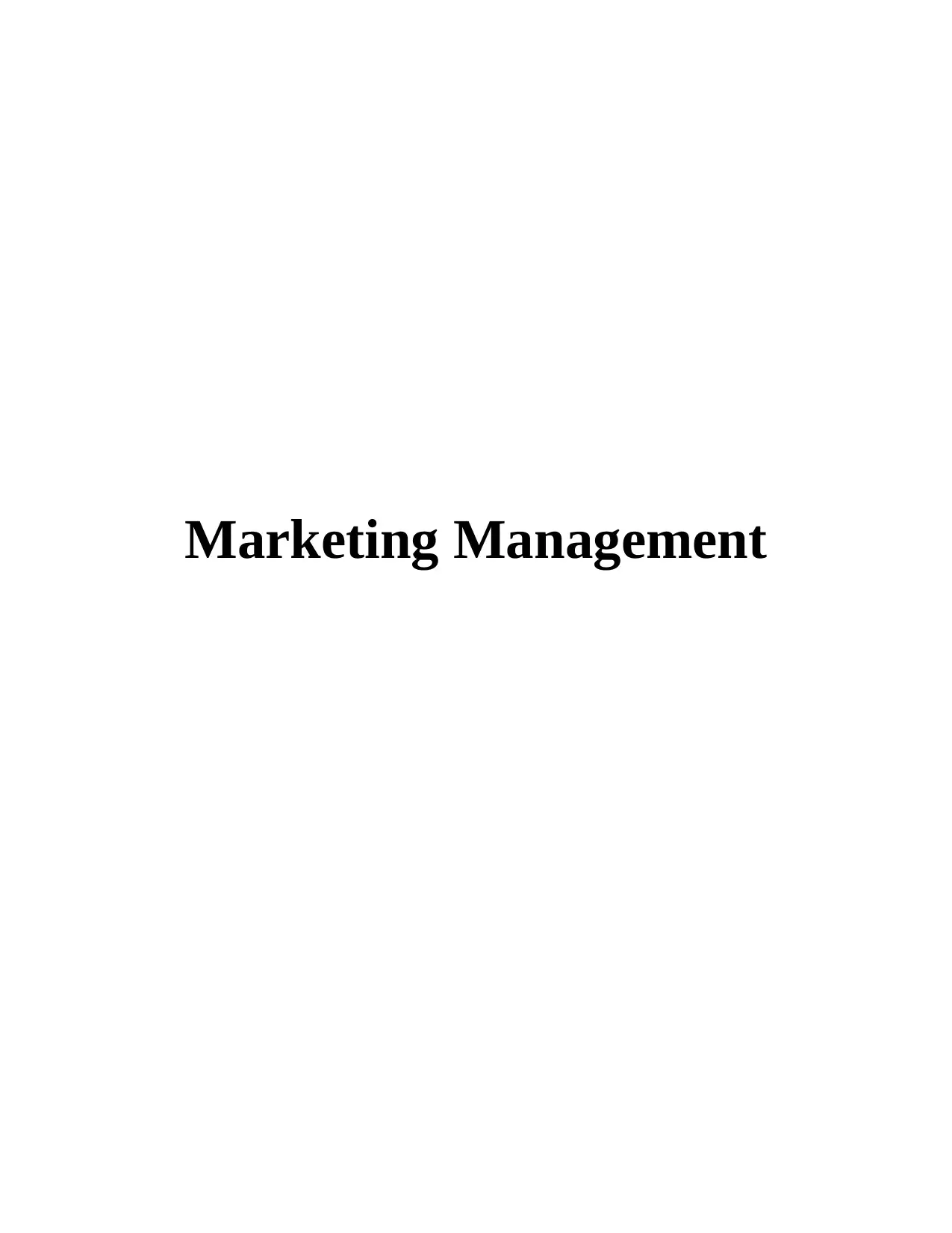
Marketing Management
Paraphrase This Document
Need a fresh take? Get an instant paraphrase of this document with our AI Paraphraser
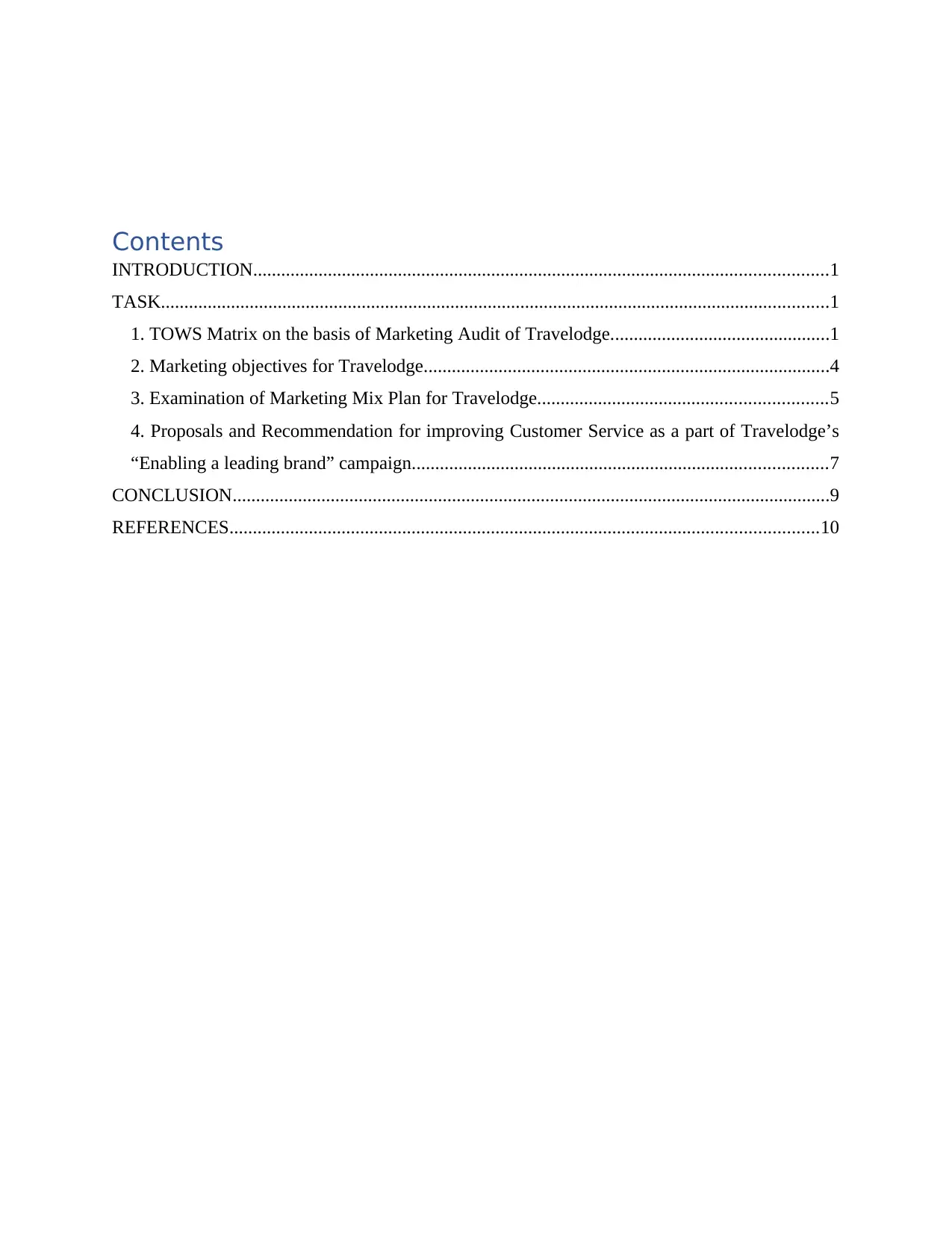
Contents
INTRODUCTION...........................................................................................................................1
TASK...............................................................................................................................................1
1. TOWS Matrix on the basis of Marketing Audit of Travelodge...............................................1
2. Marketing objectives for Travelodge.......................................................................................4
3. Examination of Marketing Mix Plan for Travelodge..............................................................5
4. Proposals and Recommendation for improving Customer Service as a part of Travelodge’s
“Enabling a leading brand” campaign.........................................................................................7
CONCLUSION................................................................................................................................9
REFERENCES..............................................................................................................................10
INTRODUCTION...........................................................................................................................1
TASK...............................................................................................................................................1
1. TOWS Matrix on the basis of Marketing Audit of Travelodge...............................................1
2. Marketing objectives for Travelodge.......................................................................................4
3. Examination of Marketing Mix Plan for Travelodge..............................................................5
4. Proposals and Recommendation for improving Customer Service as a part of Travelodge’s
“Enabling a leading brand” campaign.........................................................................................7
CONCLUSION................................................................................................................................9
REFERENCES..............................................................................................................................10

⊘ This is a preview!⊘
Do you want full access?
Subscribe today to unlock all pages.

Trusted by 1+ million students worldwide
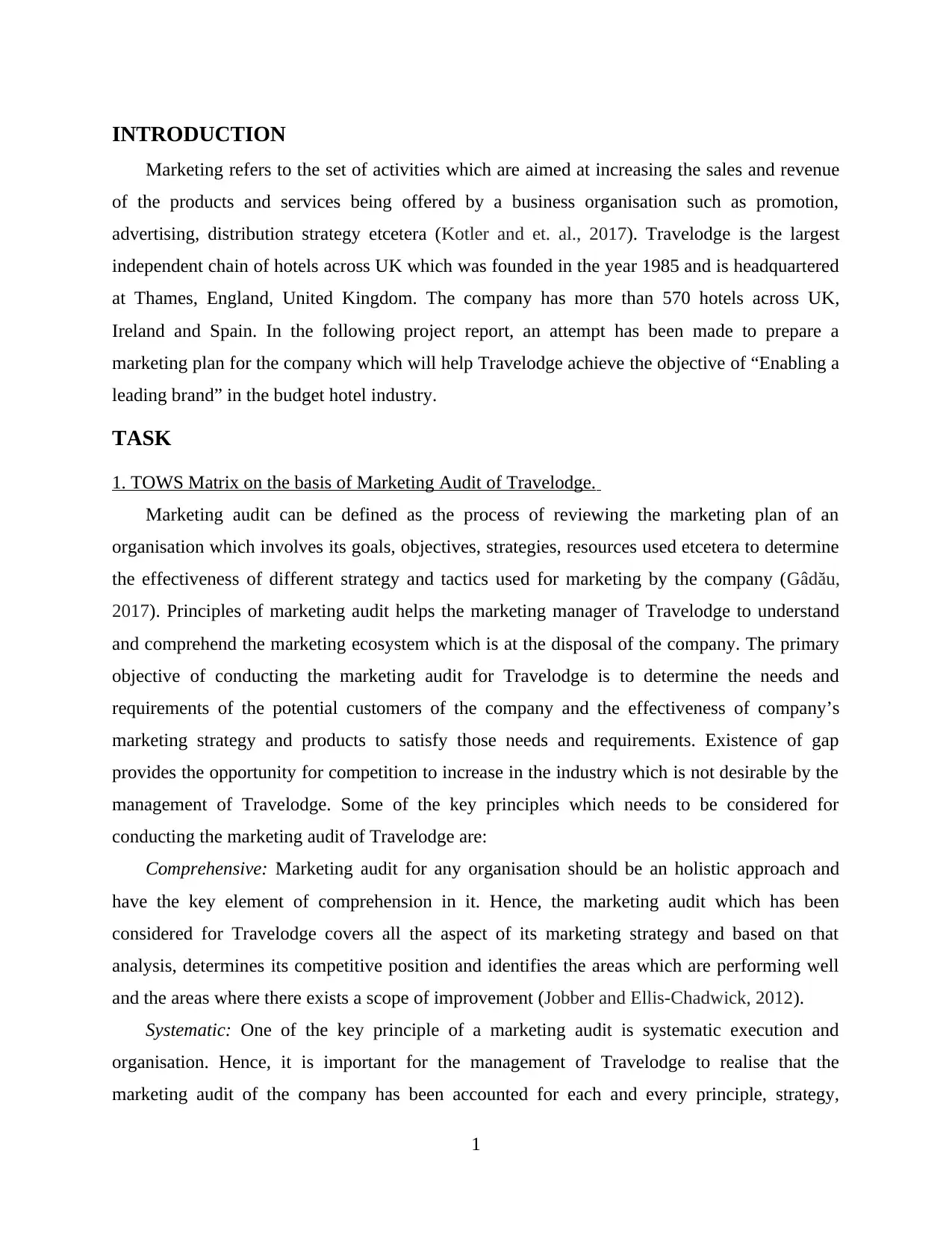
INTRODUCTION
Marketing refers to the set of activities which are aimed at increasing the sales and revenue
of the products and services being offered by a business organisation such as promotion,
advertising, distribution strategy etcetera (Kotler and et. al., 2017). Travelodge is the largest
independent chain of hotels across UK which was founded in the year 1985 and is headquartered
at Thames, England, United Kingdom. The company has more than 570 hotels across UK,
Ireland and Spain. In the following project report, an attempt has been made to prepare a
marketing plan for the company which will help Travelodge achieve the objective of “Enabling a
leading brand” in the budget hotel industry.
TASK
1. TOWS Matrix on the basis of Marketing Audit of Travelodge.
Marketing audit can be defined as the process of reviewing the marketing plan of an
organisation which involves its goals, objectives, strategies, resources used etcetera to determine
the effectiveness of different strategy and tactics used for marketing by the company (Gâdău,
2017). Principles of marketing audit helps the marketing manager of Travelodge to understand
and comprehend the marketing ecosystem which is at the disposal of the company. The primary
objective of conducting the marketing audit for Travelodge is to determine the needs and
requirements of the potential customers of the company and the effectiveness of company’s
marketing strategy and products to satisfy those needs and requirements. Existence of gap
provides the opportunity for competition to increase in the industry which is not desirable by the
management of Travelodge. Some of the key principles which needs to be considered for
conducting the marketing audit of Travelodge are:
Comprehensive: Marketing audit for any organisation should be an holistic approach and
have the key element of comprehension in it. Hence, the marketing audit which has been
considered for Travelodge covers all the aspect of its marketing strategy and based on that
analysis, determines its competitive position and identifies the areas which are performing well
and the areas where there exists a scope of improvement (Jobber and Ellis-Chadwick, 2012).
Systematic: One of the key principle of a marketing audit is systematic execution and
organisation. Hence, it is important for the management of Travelodge to realise that the
marketing audit of the company has been accounted for each and every principle, strategy,
1
Marketing refers to the set of activities which are aimed at increasing the sales and revenue
of the products and services being offered by a business organisation such as promotion,
advertising, distribution strategy etcetera (Kotler and et. al., 2017). Travelodge is the largest
independent chain of hotels across UK which was founded in the year 1985 and is headquartered
at Thames, England, United Kingdom. The company has more than 570 hotels across UK,
Ireland and Spain. In the following project report, an attempt has been made to prepare a
marketing plan for the company which will help Travelodge achieve the objective of “Enabling a
leading brand” in the budget hotel industry.
TASK
1. TOWS Matrix on the basis of Marketing Audit of Travelodge.
Marketing audit can be defined as the process of reviewing the marketing plan of an
organisation which involves its goals, objectives, strategies, resources used etcetera to determine
the effectiveness of different strategy and tactics used for marketing by the company (Gâdău,
2017). Principles of marketing audit helps the marketing manager of Travelodge to understand
and comprehend the marketing ecosystem which is at the disposal of the company. The primary
objective of conducting the marketing audit for Travelodge is to determine the needs and
requirements of the potential customers of the company and the effectiveness of company’s
marketing strategy and products to satisfy those needs and requirements. Existence of gap
provides the opportunity for competition to increase in the industry which is not desirable by the
management of Travelodge. Some of the key principles which needs to be considered for
conducting the marketing audit of Travelodge are:
Comprehensive: Marketing audit for any organisation should be an holistic approach and
have the key element of comprehension in it. Hence, the marketing audit which has been
considered for Travelodge covers all the aspect of its marketing strategy and based on that
analysis, determines its competitive position and identifies the areas which are performing well
and the areas where there exists a scope of improvement (Jobber and Ellis-Chadwick, 2012).
Systematic: One of the key principle of a marketing audit is systematic execution and
organisation. Hence, it is important for the management of Travelodge to realise that the
marketing audit of the company has been accounted for each and every principle, strategy,
1
Paraphrase This Document
Need a fresh take? Get an instant paraphrase of this document with our AI Paraphraser
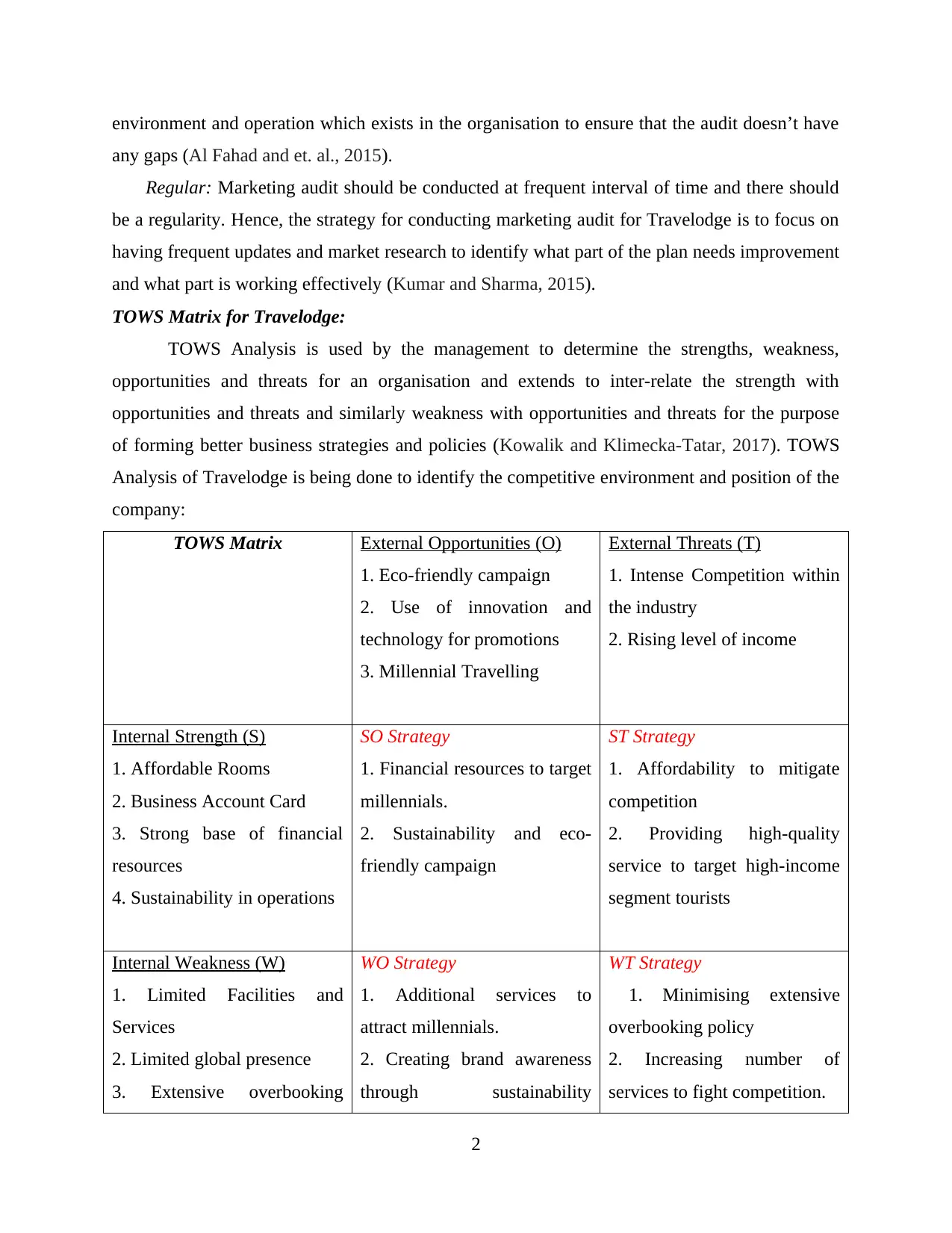
environment and operation which exists in the organisation to ensure that the audit doesn’t have
any gaps (Al Fahad and et. al., 2015).
Regular: Marketing audit should be conducted at frequent interval of time and there should
be a regularity. Hence, the strategy for conducting marketing audit for Travelodge is to focus on
having frequent updates and market research to identify what part of the plan needs improvement
and what part is working effectively (Kumar and Sharma, 2015).
TOWS Matrix for Travelodge:
TOWS Analysis is used by the management to determine the strengths, weakness,
opportunities and threats for an organisation and extends to inter-relate the strength with
opportunities and threats and similarly weakness with opportunities and threats for the purpose
of forming better business strategies and policies (Kowalik and Klimecka-Tatar, 2017). TOWS
Analysis of Travelodge is being done to identify the competitive environment and position of the
company:
TOWS Matrix External Opportunities (O)
1. Eco-friendly campaign
2. Use of innovation and
technology for promotions
3. Millennial Travelling
External Threats (T)
1. Intense Competition within
the industry
2. Rising level of income
Internal Strength (S)
1. Affordable Rooms
2. Business Account Card
3. Strong base of financial
resources
4. Sustainability in operations
SO Strategy
1. Financial resources to target
millennials.
2. Sustainability and eco-
friendly campaign
ST Strategy
1. Affordability to mitigate
competition
2. Providing high-quality
service to target high-income
segment tourists
Internal Weakness (W)
1. Limited Facilities and
Services
2. Limited global presence
3. Extensive overbooking
WO Strategy
1. Additional services to
attract millennials.
2. Creating brand awareness
through sustainability
WT Strategy
1. Minimising extensive
overbooking policy
2. Increasing number of
services to fight competition.
2
any gaps (Al Fahad and et. al., 2015).
Regular: Marketing audit should be conducted at frequent interval of time and there should
be a regularity. Hence, the strategy for conducting marketing audit for Travelodge is to focus on
having frequent updates and market research to identify what part of the plan needs improvement
and what part is working effectively (Kumar and Sharma, 2015).
TOWS Matrix for Travelodge:
TOWS Analysis is used by the management to determine the strengths, weakness,
opportunities and threats for an organisation and extends to inter-relate the strength with
opportunities and threats and similarly weakness with opportunities and threats for the purpose
of forming better business strategies and policies (Kowalik and Klimecka-Tatar, 2017). TOWS
Analysis of Travelodge is being done to identify the competitive environment and position of the
company:
TOWS Matrix External Opportunities (O)
1. Eco-friendly campaign
2. Use of innovation and
technology for promotions
3. Millennial Travelling
External Threats (T)
1. Intense Competition within
the industry
2. Rising level of income
Internal Strength (S)
1. Affordable Rooms
2. Business Account Card
3. Strong base of financial
resources
4. Sustainability in operations
SO Strategy
1. Financial resources to target
millennials.
2. Sustainability and eco-
friendly campaign
ST Strategy
1. Affordability to mitigate
competition
2. Providing high-quality
service to target high-income
segment tourists
Internal Weakness (W)
1. Limited Facilities and
Services
2. Limited global presence
3. Extensive overbooking
WO Strategy
1. Additional services to
attract millennials.
2. Creating brand awareness
through sustainability
WT Strategy
1. Minimising extensive
overbooking policy
2. Increasing number of
services to fight competition.
2
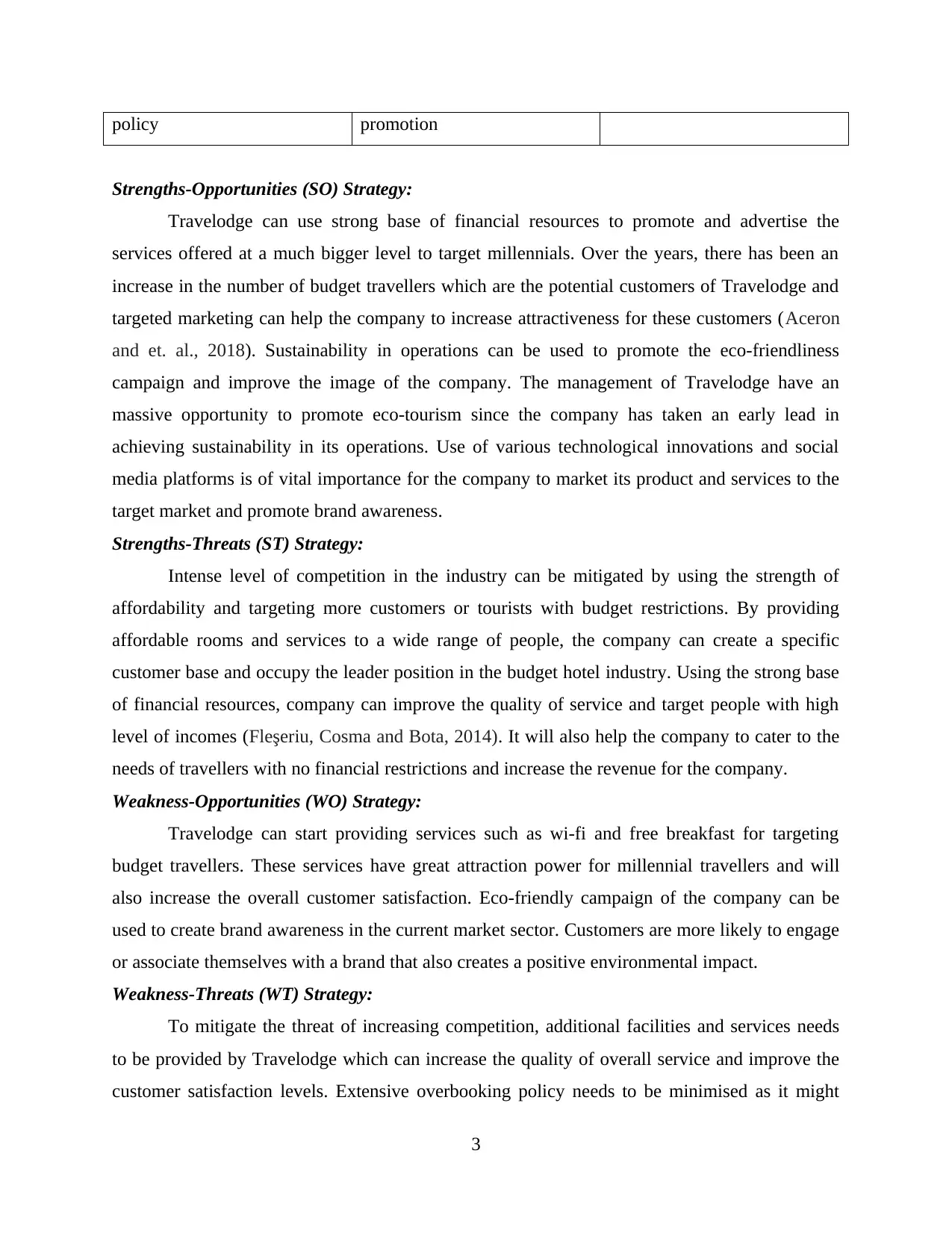
policy promotion
Strengths-Opportunities (SO) Strategy:
Travelodge can use strong base of financial resources to promote and advertise the
services offered at a much bigger level to target millennials. Over the years, there has been an
increase in the number of budget travellers which are the potential customers of Travelodge and
targeted marketing can help the company to increase attractiveness for these customers (Aceron
and et. al., 2018). Sustainability in operations can be used to promote the eco-friendliness
campaign and improve the image of the company. The management of Travelodge have an
massive opportunity to promote eco-tourism since the company has taken an early lead in
achieving sustainability in its operations. Use of various technological innovations and social
media platforms is of vital importance for the company to market its product and services to the
target market and promote brand awareness.
Strengths-Threats (ST) Strategy:
Intense level of competition in the industry can be mitigated by using the strength of
affordability and targeting more customers or tourists with budget restrictions. By providing
affordable rooms and services to a wide range of people, the company can create a specific
customer base and occupy the leader position in the budget hotel industry. Using the strong base
of financial resources, company can improve the quality of service and target people with high
level of incomes (Fleşeriu, Cosma and Bota, 2014). It will also help the company to cater to the
needs of travellers with no financial restrictions and increase the revenue for the company.
Weakness-Opportunities (WO) Strategy:
Travelodge can start providing services such as wi-fi and free breakfast for targeting
budget travellers. These services have great attraction power for millennial travellers and will
also increase the overall customer satisfaction. Eco-friendly campaign of the company can be
used to create brand awareness in the current market sector. Customers are more likely to engage
or associate themselves with a brand that also creates a positive environmental impact.
Weakness-Threats (WT) Strategy:
To mitigate the threat of increasing competition, additional facilities and services needs
to be provided by Travelodge which can increase the quality of overall service and improve the
customer satisfaction levels. Extensive overbooking policy needs to be minimised as it might
3
Strengths-Opportunities (SO) Strategy:
Travelodge can use strong base of financial resources to promote and advertise the
services offered at a much bigger level to target millennials. Over the years, there has been an
increase in the number of budget travellers which are the potential customers of Travelodge and
targeted marketing can help the company to increase attractiveness for these customers (Aceron
and et. al., 2018). Sustainability in operations can be used to promote the eco-friendliness
campaign and improve the image of the company. The management of Travelodge have an
massive opportunity to promote eco-tourism since the company has taken an early lead in
achieving sustainability in its operations. Use of various technological innovations and social
media platforms is of vital importance for the company to market its product and services to the
target market and promote brand awareness.
Strengths-Threats (ST) Strategy:
Intense level of competition in the industry can be mitigated by using the strength of
affordability and targeting more customers or tourists with budget restrictions. By providing
affordable rooms and services to a wide range of people, the company can create a specific
customer base and occupy the leader position in the budget hotel industry. Using the strong base
of financial resources, company can improve the quality of service and target people with high
level of incomes (Fleşeriu, Cosma and Bota, 2014). It will also help the company to cater to the
needs of travellers with no financial restrictions and increase the revenue for the company.
Weakness-Opportunities (WO) Strategy:
Travelodge can start providing services such as wi-fi and free breakfast for targeting
budget travellers. These services have great attraction power for millennial travellers and will
also increase the overall customer satisfaction. Eco-friendly campaign of the company can be
used to create brand awareness in the current market sector. Customers are more likely to engage
or associate themselves with a brand that also creates a positive environmental impact.
Weakness-Threats (WT) Strategy:
To mitigate the threat of increasing competition, additional facilities and services needs
to be provided by Travelodge which can increase the quality of overall service and improve the
customer satisfaction levels. Extensive overbooking policy needs to be minimised as it might
3
⊘ This is a preview!⊘
Do you want full access?
Subscribe today to unlock all pages.

Trusted by 1+ million students worldwide
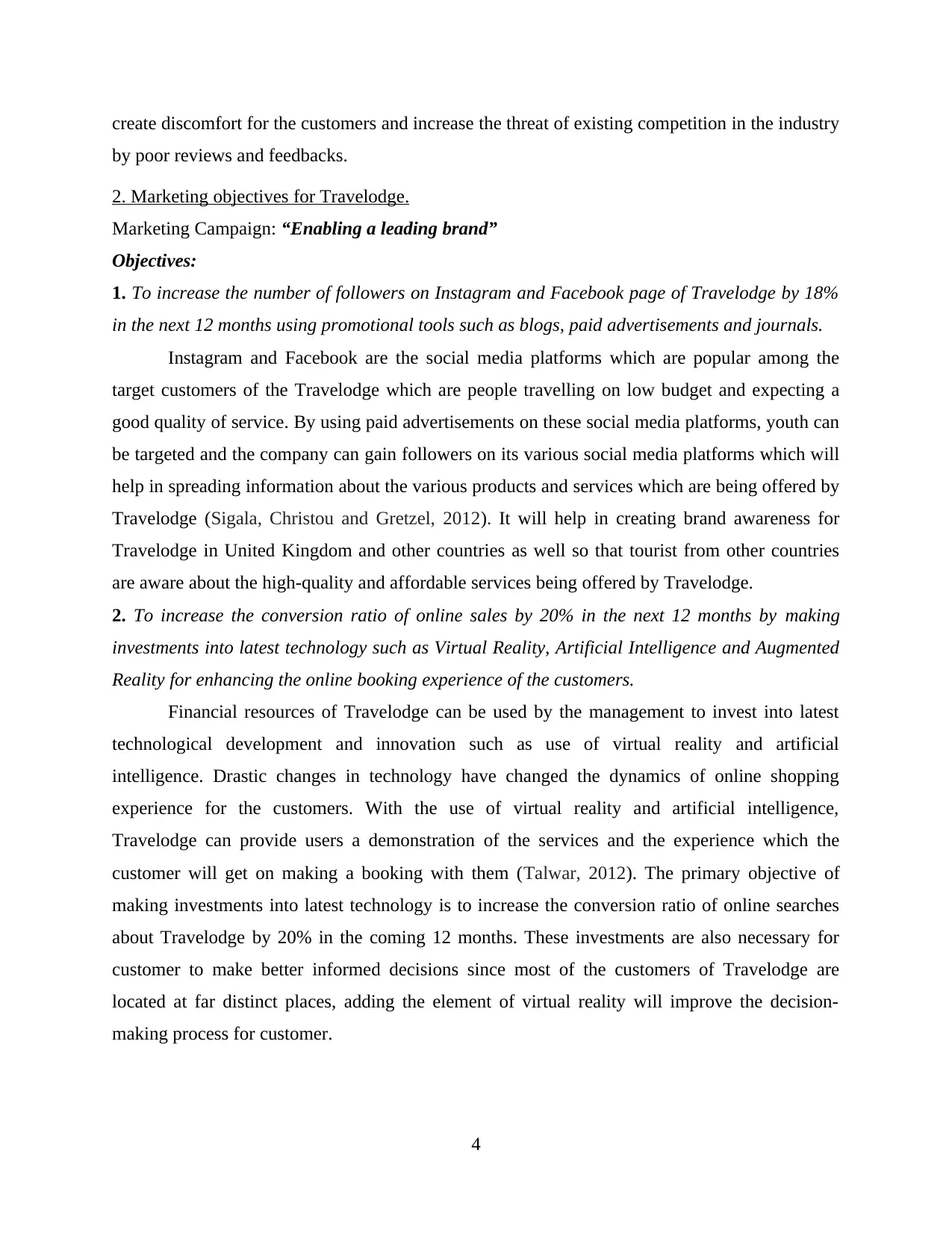
create discomfort for the customers and increase the threat of existing competition in the industry
by poor reviews and feedbacks.
2. Marketing objectives for Travelodge.
Marketing Campaign: “Enabling a leading brand”
Objectives:
1. To increase the number of followers on Instagram and Facebook page of Travelodge by 18%
in the next 12 months using promotional tools such as blogs, paid advertisements and journals.
Instagram and Facebook are the social media platforms which are popular among the
target customers of the Travelodge which are people travelling on low budget and expecting a
good quality of service. By using paid advertisements on these social media platforms, youth can
be targeted and the company can gain followers on its various social media platforms which will
help in spreading information about the various products and services which are being offered by
Travelodge (Sigala, Christou and Gretzel, 2012). It will help in creating brand awareness for
Travelodge in United Kingdom and other countries as well so that tourist from other countries
are aware about the high-quality and affordable services being offered by Travelodge.
2. To increase the conversion ratio of online sales by 20% in the next 12 months by making
investments into latest technology such as Virtual Reality, Artificial Intelligence and Augmented
Reality for enhancing the online booking experience of the customers.
Financial resources of Travelodge can be used by the management to invest into latest
technological development and innovation such as use of virtual reality and artificial
intelligence. Drastic changes in technology have changed the dynamics of online shopping
experience for the customers. With the use of virtual reality and artificial intelligence,
Travelodge can provide users a demonstration of the services and the experience which the
customer will get on making a booking with them (Talwar, 2012). The primary objective of
making investments into latest technology is to increase the conversion ratio of online searches
about Travelodge by 20% in the coming 12 months. These investments are also necessary for
customer to make better informed decisions since most of the customers of Travelodge are
located at far distinct places, adding the element of virtual reality will improve the decision-
making process for customer.
4
by poor reviews and feedbacks.
2. Marketing objectives for Travelodge.
Marketing Campaign: “Enabling a leading brand”
Objectives:
1. To increase the number of followers on Instagram and Facebook page of Travelodge by 18%
in the next 12 months using promotional tools such as blogs, paid advertisements and journals.
Instagram and Facebook are the social media platforms which are popular among the
target customers of the Travelodge which are people travelling on low budget and expecting a
good quality of service. By using paid advertisements on these social media platforms, youth can
be targeted and the company can gain followers on its various social media platforms which will
help in spreading information about the various products and services which are being offered by
Travelodge (Sigala, Christou and Gretzel, 2012). It will help in creating brand awareness for
Travelodge in United Kingdom and other countries as well so that tourist from other countries
are aware about the high-quality and affordable services being offered by Travelodge.
2. To increase the conversion ratio of online sales by 20% in the next 12 months by making
investments into latest technology such as Virtual Reality, Artificial Intelligence and Augmented
Reality for enhancing the online booking experience of the customers.
Financial resources of Travelodge can be used by the management to invest into latest
technological development and innovation such as use of virtual reality and artificial
intelligence. Drastic changes in technology have changed the dynamics of online shopping
experience for the customers. With the use of virtual reality and artificial intelligence,
Travelodge can provide users a demonstration of the services and the experience which the
customer will get on making a booking with them (Talwar, 2012). The primary objective of
making investments into latest technology is to increase the conversion ratio of online searches
about Travelodge by 20% in the coming 12 months. These investments are also necessary for
customer to make better informed decisions since most of the customers of Travelodge are
located at far distinct places, adding the element of virtual reality will improve the decision-
making process for customer.
4
Paraphrase This Document
Need a fresh take? Get an instant paraphrase of this document with our AI Paraphraser
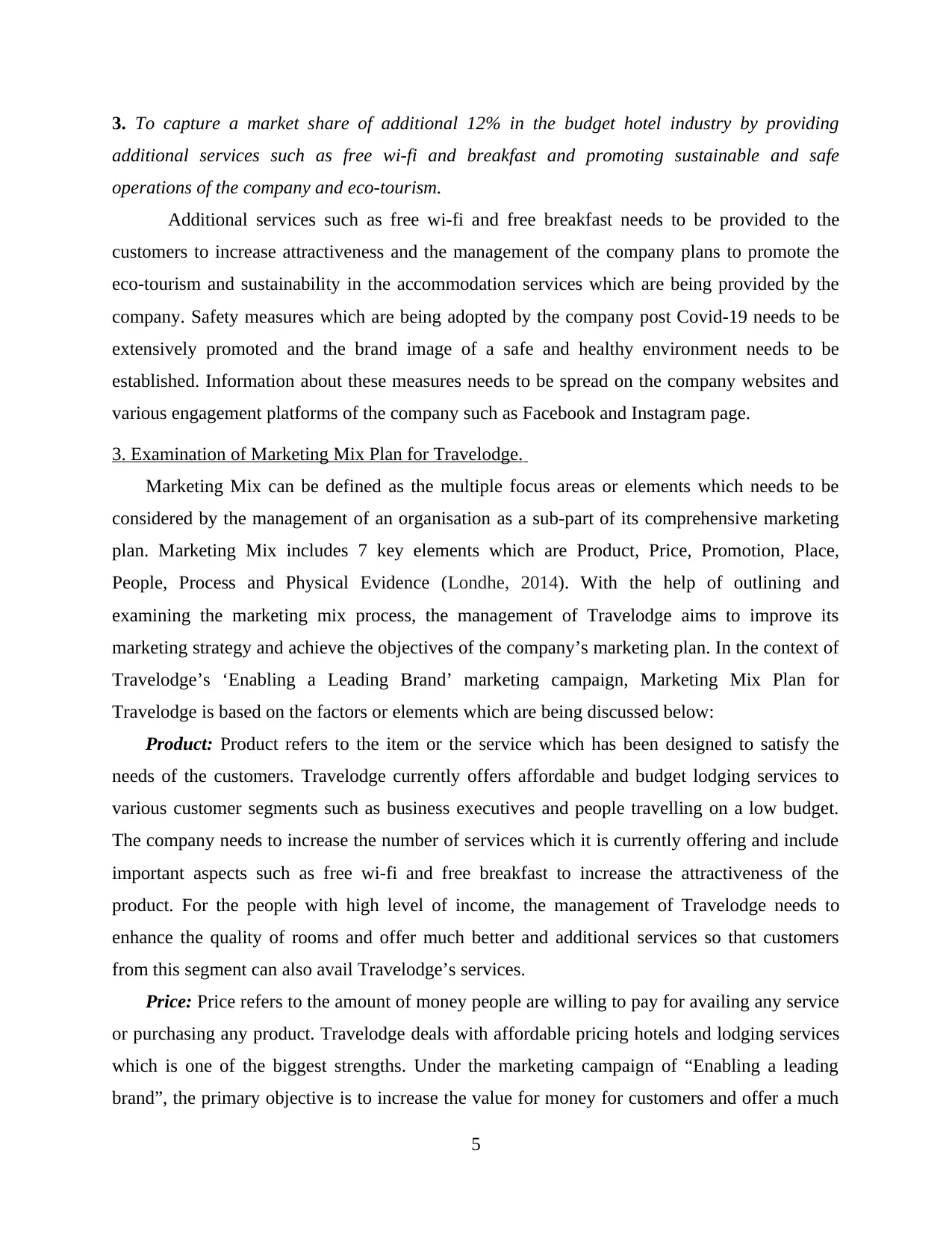
3. To capture a market share of additional 12% in the budget hotel industry by providing
additional services such as free wi-fi and breakfast and promoting sustainable and safe
operations of the company and eco-tourism.
Additional services such as free wi-fi and free breakfast needs to be provided to the
customers to increase attractiveness and the management of the company plans to promote the
eco-tourism and sustainability in the accommodation services which are being provided by the
company. Safety measures which are being adopted by the company post Covid-19 needs to be
extensively promoted and the brand image of a safe and healthy environment needs to be
established. Information about these measures needs to be spread on the company websites and
various engagement platforms of the company such as Facebook and Instagram page.
3. Examination of Marketing Mix Plan for Travelodge.
Marketing Mix can be defined as the multiple focus areas or elements which needs to be
considered by the management of an organisation as a sub-part of its comprehensive marketing
plan. Marketing Mix includes 7 key elements which are Product, Price, Promotion, Place,
People, Process and Physical Evidence (Londhe, 2014). With the help of outlining and
examining the marketing mix process, the management of Travelodge aims to improve its
marketing strategy and achieve the objectives of the company’s marketing plan. In the context of
Travelodge’s ‘Enabling a Leading Brand’ marketing campaign, Marketing Mix Plan for
Travelodge is based on the factors or elements which are being discussed below:
Product: Product refers to the item or the service which has been designed to satisfy the
needs of the customers. Travelodge currently offers affordable and budget lodging services to
various customer segments such as business executives and people travelling on a low budget.
The company needs to increase the number of services which it is currently offering and include
important aspects such as free wi-fi and free breakfast to increase the attractiveness of the
product. For the people with high level of income, the management of Travelodge needs to
enhance the quality of rooms and offer much better and additional services so that customers
from this segment can also avail Travelodge’s services.
Price: Price refers to the amount of money people are willing to pay for availing any service
or purchasing any product. Travelodge deals with affordable pricing hotels and lodging services
which is one of the biggest strengths. Under the marketing campaign of “Enabling a leading
brand”, the primary objective is to increase the value for money for customers and offer a much
5
additional services such as free wi-fi and breakfast and promoting sustainable and safe
operations of the company and eco-tourism.
Additional services such as free wi-fi and free breakfast needs to be provided to the
customers to increase attractiveness and the management of the company plans to promote the
eco-tourism and sustainability in the accommodation services which are being provided by the
company. Safety measures which are being adopted by the company post Covid-19 needs to be
extensively promoted and the brand image of a safe and healthy environment needs to be
established. Information about these measures needs to be spread on the company websites and
various engagement platforms of the company such as Facebook and Instagram page.
3. Examination of Marketing Mix Plan for Travelodge.
Marketing Mix can be defined as the multiple focus areas or elements which needs to be
considered by the management of an organisation as a sub-part of its comprehensive marketing
plan. Marketing Mix includes 7 key elements which are Product, Price, Promotion, Place,
People, Process and Physical Evidence (Londhe, 2014). With the help of outlining and
examining the marketing mix process, the management of Travelodge aims to improve its
marketing strategy and achieve the objectives of the company’s marketing plan. In the context of
Travelodge’s ‘Enabling a Leading Brand’ marketing campaign, Marketing Mix Plan for
Travelodge is based on the factors or elements which are being discussed below:
Product: Product refers to the item or the service which has been designed to satisfy the
needs of the customers. Travelodge currently offers affordable and budget lodging services to
various customer segments such as business executives and people travelling on a low budget.
The company needs to increase the number of services which it is currently offering and include
important aspects such as free wi-fi and free breakfast to increase the attractiveness of the
product. For the people with high level of income, the management of Travelodge needs to
enhance the quality of rooms and offer much better and additional services so that customers
from this segment can also avail Travelodge’s services.
Price: Price refers to the amount of money people are willing to pay for availing any service
or purchasing any product. Travelodge deals with affordable pricing hotels and lodging services
which is one of the biggest strengths. Under the marketing campaign of “Enabling a leading
brand”, the primary objective is to increase the value for money for customers and offer a much
5
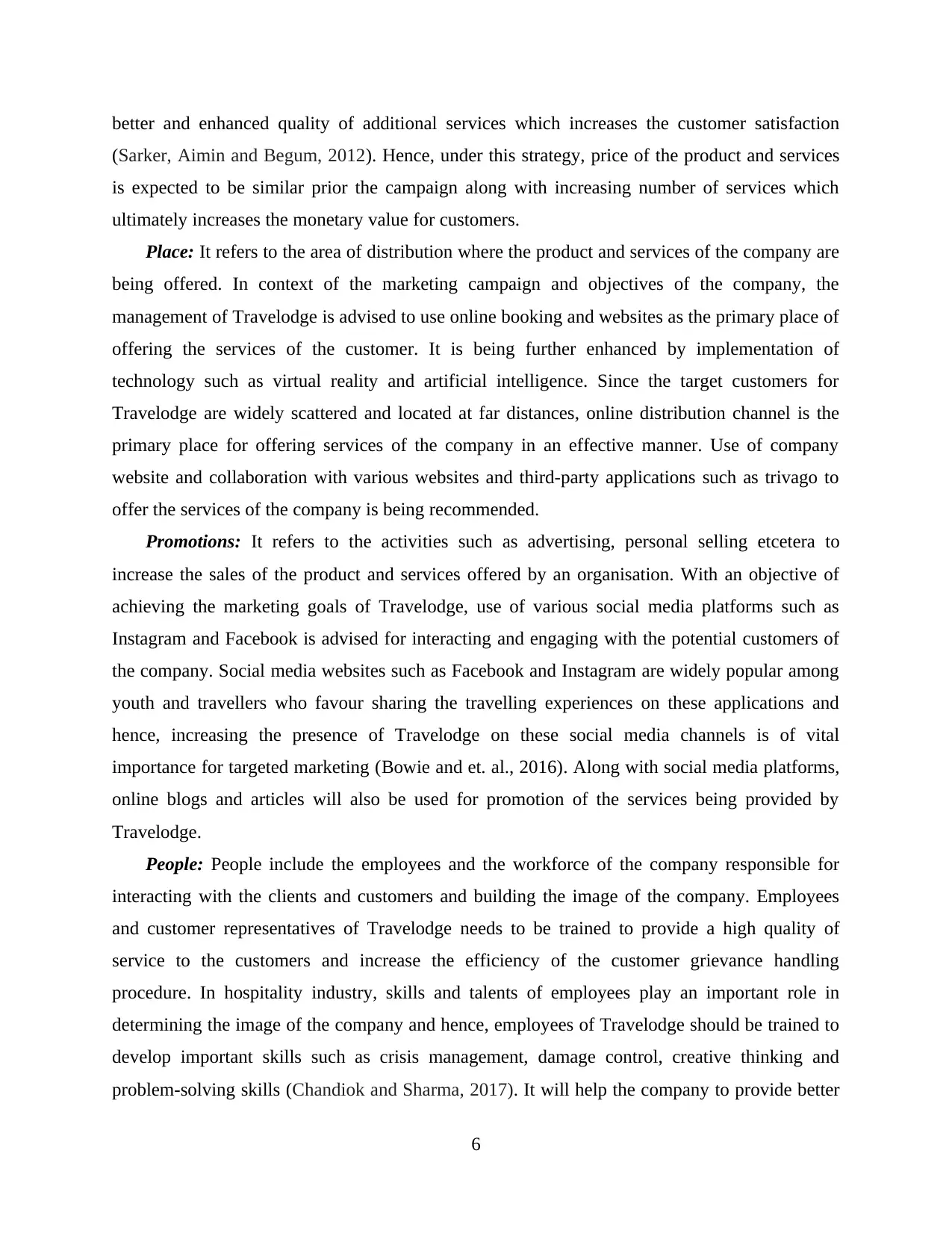
better and enhanced quality of additional services which increases the customer satisfaction
(Sarker, Aimin and Begum, 2012). Hence, under this strategy, price of the product and services
is expected to be similar prior the campaign along with increasing number of services which
ultimately increases the monetary value for customers.
Place: It refers to the area of distribution where the product and services of the company are
being offered. In context of the marketing campaign and objectives of the company, the
management of Travelodge is advised to use online booking and websites as the primary place of
offering the services of the customer. It is being further enhanced by implementation of
technology such as virtual reality and artificial intelligence. Since the target customers for
Travelodge are widely scattered and located at far distances, online distribution channel is the
primary place for offering services of the company in an effective manner. Use of company
website and collaboration with various websites and third-party applications such as trivago to
offer the services of the company is being recommended.
Promotions: It refers to the activities such as advertising, personal selling etcetera to
increase the sales of the product and services offered by an organisation. With an objective of
achieving the marketing goals of Travelodge, use of various social media platforms such as
Instagram and Facebook is advised for interacting and engaging with the potential customers of
the company. Social media websites such as Facebook and Instagram are widely popular among
youth and travellers who favour sharing the travelling experiences on these applications and
hence, increasing the presence of Travelodge on these social media channels is of vital
importance for targeted marketing (Bowie and et. al., 2016). Along with social media platforms,
online blogs and articles will also be used for promotion of the services being provided by
Travelodge.
People: People include the employees and the workforce of the company responsible for
interacting with the clients and customers and building the image of the company. Employees
and customer representatives of Travelodge needs to be trained to provide a high quality of
service to the customers and increase the efficiency of the customer grievance handling
procedure. In hospitality industry, skills and talents of employees play an important role in
determining the image of the company and hence, employees of Travelodge should be trained to
develop important skills such as crisis management, damage control, creative thinking and
problem-solving skills (Chandiok and Sharma, 2017). It will help the company to provide better
6
(Sarker, Aimin and Begum, 2012). Hence, under this strategy, price of the product and services
is expected to be similar prior the campaign along with increasing number of services which
ultimately increases the monetary value for customers.
Place: It refers to the area of distribution where the product and services of the company are
being offered. In context of the marketing campaign and objectives of the company, the
management of Travelodge is advised to use online booking and websites as the primary place of
offering the services of the customer. It is being further enhanced by implementation of
technology such as virtual reality and artificial intelligence. Since the target customers for
Travelodge are widely scattered and located at far distances, online distribution channel is the
primary place for offering services of the company in an effective manner. Use of company
website and collaboration with various websites and third-party applications such as trivago to
offer the services of the company is being recommended.
Promotions: It refers to the activities such as advertising, personal selling etcetera to
increase the sales of the product and services offered by an organisation. With an objective of
achieving the marketing goals of Travelodge, use of various social media platforms such as
Instagram and Facebook is advised for interacting and engaging with the potential customers of
the company. Social media websites such as Facebook and Instagram are widely popular among
youth and travellers who favour sharing the travelling experiences on these applications and
hence, increasing the presence of Travelodge on these social media channels is of vital
importance for targeted marketing (Bowie and et. al., 2016). Along with social media platforms,
online blogs and articles will also be used for promotion of the services being provided by
Travelodge.
People: People include the employees and the workforce of the company responsible for
interacting with the clients and customers and building the image of the company. Employees
and customer representatives of Travelodge needs to be trained to provide a high quality of
service to the customers and increase the efficiency of the customer grievance handling
procedure. In hospitality industry, skills and talents of employees play an important role in
determining the image of the company and hence, employees of Travelodge should be trained to
develop important skills such as crisis management, damage control, creative thinking and
problem-solving skills (Chandiok and Sharma, 2017). It will help the company to provide better
6
⊘ This is a preview!⊘
Do you want full access?
Subscribe today to unlock all pages.

Trusted by 1+ million students worldwide
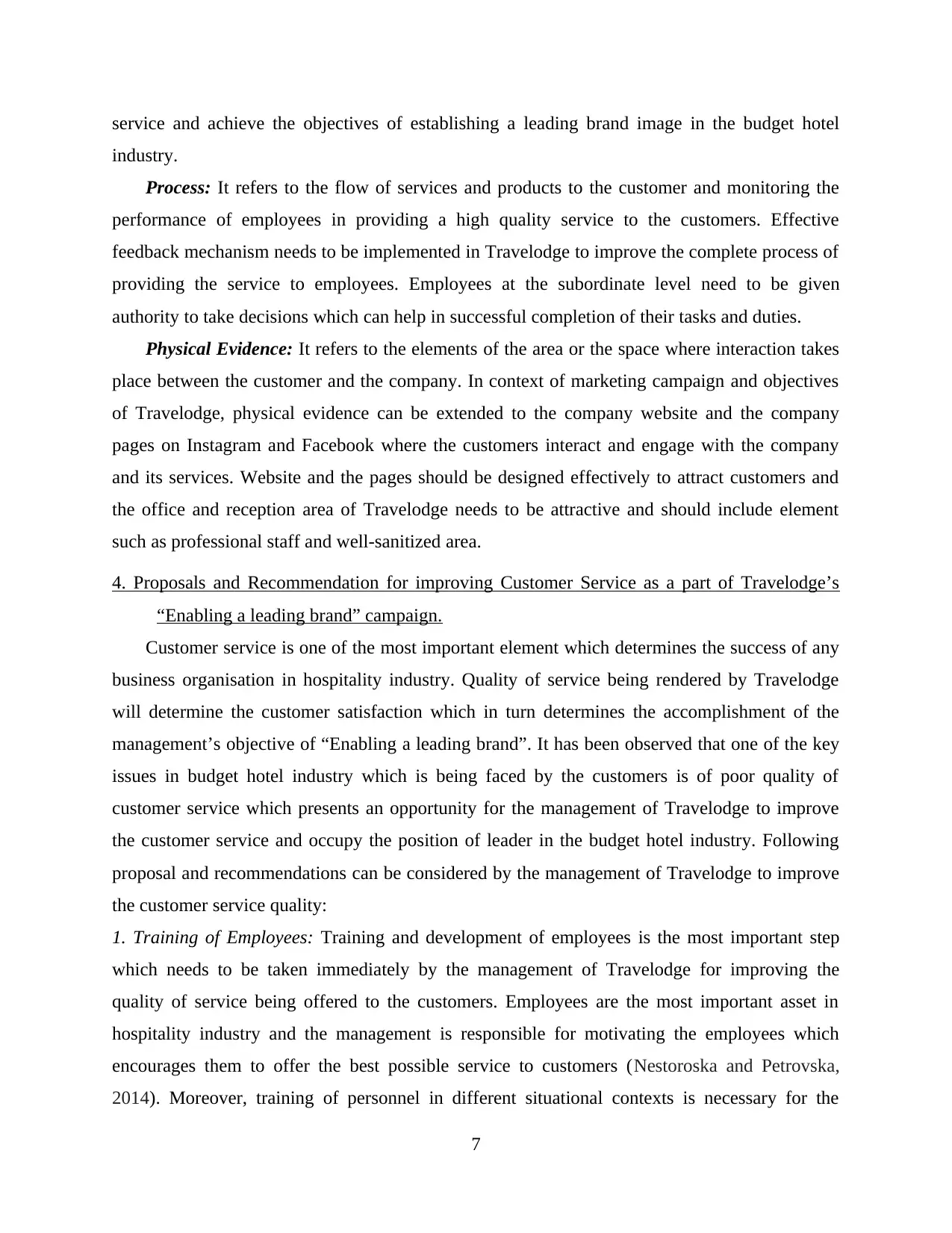
service and achieve the objectives of establishing a leading brand image in the budget hotel
industry.
Process: It refers to the flow of services and products to the customer and monitoring the
performance of employees in providing a high quality service to the customers. Effective
feedback mechanism needs to be implemented in Travelodge to improve the complete process of
providing the service to employees. Employees at the subordinate level need to be given
authority to take decisions which can help in successful completion of their tasks and duties.
Physical Evidence: It refers to the elements of the area or the space where interaction takes
place between the customer and the company. In context of marketing campaign and objectives
of Travelodge, physical evidence can be extended to the company website and the company
pages on Instagram and Facebook where the customers interact and engage with the company
and its services. Website and the pages should be designed effectively to attract customers and
the office and reception area of Travelodge needs to be attractive and should include element
such as professional staff and well-sanitized area.
4. Proposals and Recommendation for improving Customer Service as a part of Travelodge’s
“Enabling a leading brand” campaign.
Customer service is one of the most important element which determines the success of any
business organisation in hospitality industry. Quality of service being rendered by Travelodge
will determine the customer satisfaction which in turn determines the accomplishment of the
management’s objective of “Enabling a leading brand”. It has been observed that one of the key
issues in budget hotel industry which is being faced by the customers is of poor quality of
customer service which presents an opportunity for the management of Travelodge to improve
the customer service and occupy the position of leader in the budget hotel industry. Following
proposal and recommendations can be considered by the management of Travelodge to improve
the customer service quality:
1. Training of Employees: Training and development of employees is the most important step
which needs to be taken immediately by the management of Travelodge for improving the
quality of service being offered to the customers. Employees are the most important asset in
hospitality industry and the management is responsible for motivating the employees which
encourages them to offer the best possible service to customers (Nestoroska and Petrovska,
2014). Moreover, training of personnel in different situational contexts is necessary for the
7
industry.
Process: It refers to the flow of services and products to the customer and monitoring the
performance of employees in providing a high quality service to the customers. Effective
feedback mechanism needs to be implemented in Travelodge to improve the complete process of
providing the service to employees. Employees at the subordinate level need to be given
authority to take decisions which can help in successful completion of their tasks and duties.
Physical Evidence: It refers to the elements of the area or the space where interaction takes
place between the customer and the company. In context of marketing campaign and objectives
of Travelodge, physical evidence can be extended to the company website and the company
pages on Instagram and Facebook where the customers interact and engage with the company
and its services. Website and the pages should be designed effectively to attract customers and
the office and reception area of Travelodge needs to be attractive and should include element
such as professional staff and well-sanitized area.
4. Proposals and Recommendation for improving Customer Service as a part of Travelodge’s
“Enabling a leading brand” campaign.
Customer service is one of the most important element which determines the success of any
business organisation in hospitality industry. Quality of service being rendered by Travelodge
will determine the customer satisfaction which in turn determines the accomplishment of the
management’s objective of “Enabling a leading brand”. It has been observed that one of the key
issues in budget hotel industry which is being faced by the customers is of poor quality of
customer service which presents an opportunity for the management of Travelodge to improve
the customer service and occupy the position of leader in the budget hotel industry. Following
proposal and recommendations can be considered by the management of Travelodge to improve
the customer service quality:
1. Training of Employees: Training and development of employees is the most important step
which needs to be taken immediately by the management of Travelodge for improving the
quality of service being offered to the customers. Employees are the most important asset in
hospitality industry and the management is responsible for motivating the employees which
encourages them to offer the best possible service to customers (Nestoroska and Petrovska,
2014). Moreover, training of personnel in different situational contexts is necessary for the
7
Paraphrase This Document
Need a fresh take? Get an instant paraphrase of this document with our AI Paraphraser
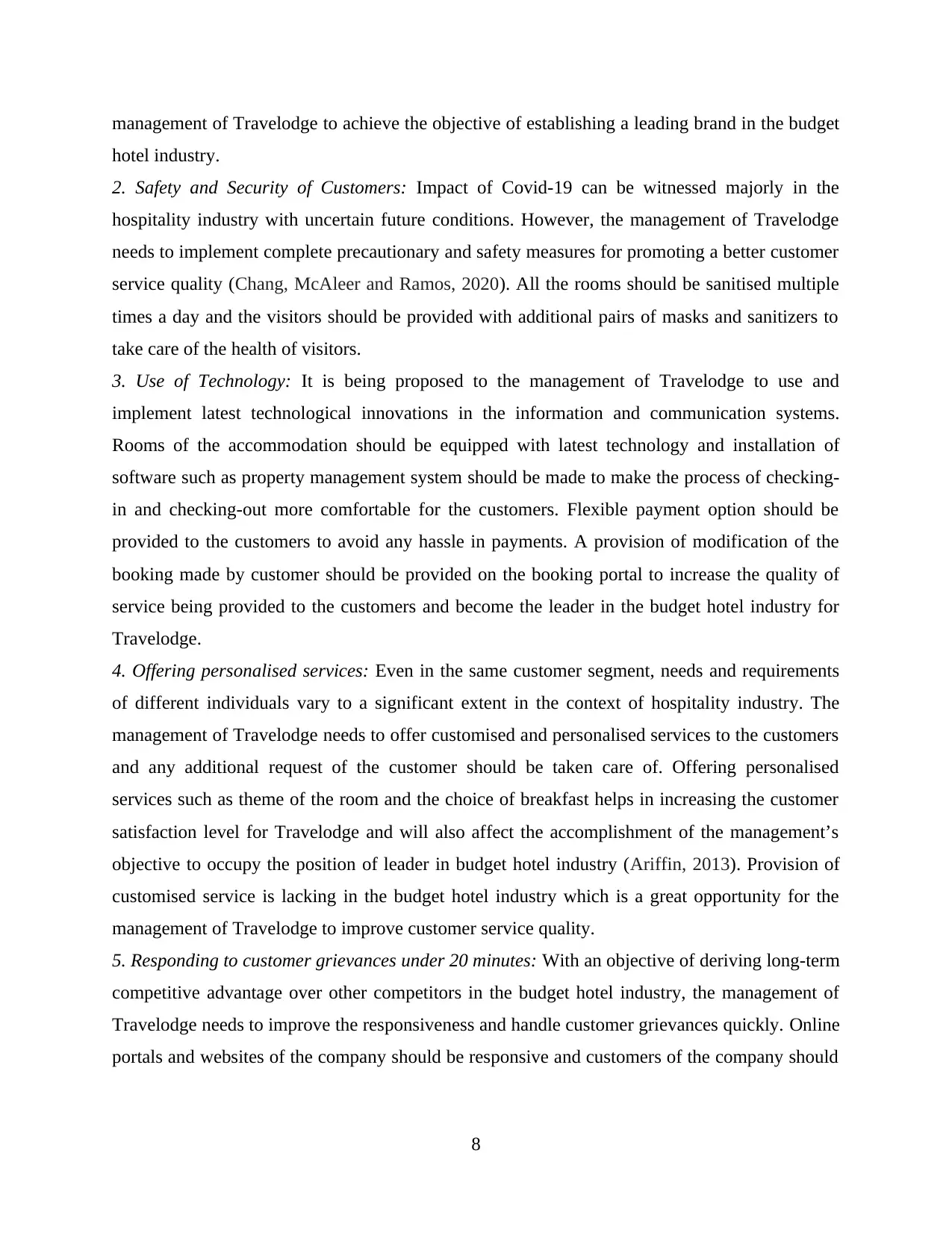
management of Travelodge to achieve the objective of establishing a leading brand in the budget
hotel industry.
2. Safety and Security of Customers: Impact of Covid-19 can be witnessed majorly in the
hospitality industry with uncertain future conditions. However, the management of Travelodge
needs to implement complete precautionary and safety measures for promoting a better customer
service quality (Chang, McAleer and Ramos, 2020). All the rooms should be sanitised multiple
times a day and the visitors should be provided with additional pairs of masks and sanitizers to
take care of the health of visitors.
3. Use of Technology: It is being proposed to the management of Travelodge to use and
implement latest technological innovations in the information and communication systems.
Rooms of the accommodation should be equipped with latest technology and installation of
software such as property management system should be made to make the process of checking-
in and checking-out more comfortable for the customers. Flexible payment option should be
provided to the customers to avoid any hassle in payments. A provision of modification of the
booking made by customer should be provided on the booking portal to increase the quality of
service being provided to the customers and become the leader in the budget hotel industry for
Travelodge.
4. Offering personalised services: Even in the same customer segment, needs and requirements
of different individuals vary to a significant extent in the context of hospitality industry. The
management of Travelodge needs to offer customised and personalised services to the customers
and any additional request of the customer should be taken care of. Offering personalised
services such as theme of the room and the choice of breakfast helps in increasing the customer
satisfaction level for Travelodge and will also affect the accomplishment of the management’s
objective to occupy the position of leader in budget hotel industry (Ariffin, 2013). Provision of
customised service is lacking in the budget hotel industry which is a great opportunity for the
management of Travelodge to improve customer service quality.
5. Responding to customer grievances under 20 minutes: With an objective of deriving long-term
competitive advantage over other competitors in the budget hotel industry, the management of
Travelodge needs to improve the responsiveness and handle customer grievances quickly. Online
portals and websites of the company should be responsive and customers of the company should
8
hotel industry.
2. Safety and Security of Customers: Impact of Covid-19 can be witnessed majorly in the
hospitality industry with uncertain future conditions. However, the management of Travelodge
needs to implement complete precautionary and safety measures for promoting a better customer
service quality (Chang, McAleer and Ramos, 2020). All the rooms should be sanitised multiple
times a day and the visitors should be provided with additional pairs of masks and sanitizers to
take care of the health of visitors.
3. Use of Technology: It is being proposed to the management of Travelodge to use and
implement latest technological innovations in the information and communication systems.
Rooms of the accommodation should be equipped with latest technology and installation of
software such as property management system should be made to make the process of checking-
in and checking-out more comfortable for the customers. Flexible payment option should be
provided to the customers to avoid any hassle in payments. A provision of modification of the
booking made by customer should be provided on the booking portal to increase the quality of
service being provided to the customers and become the leader in the budget hotel industry for
Travelodge.
4. Offering personalised services: Even in the same customer segment, needs and requirements
of different individuals vary to a significant extent in the context of hospitality industry. The
management of Travelodge needs to offer customised and personalised services to the customers
and any additional request of the customer should be taken care of. Offering personalised
services such as theme of the room and the choice of breakfast helps in increasing the customer
satisfaction level for Travelodge and will also affect the accomplishment of the management’s
objective to occupy the position of leader in budget hotel industry (Ariffin, 2013). Provision of
customised service is lacking in the budget hotel industry which is a great opportunity for the
management of Travelodge to improve customer service quality.
5. Responding to customer grievances under 20 minutes: With an objective of deriving long-term
competitive advantage over other competitors in the budget hotel industry, the management of
Travelodge needs to improve the responsiveness and handle customer grievances quickly. Online
portals and websites of the company should be responsive and customers of the company should
8
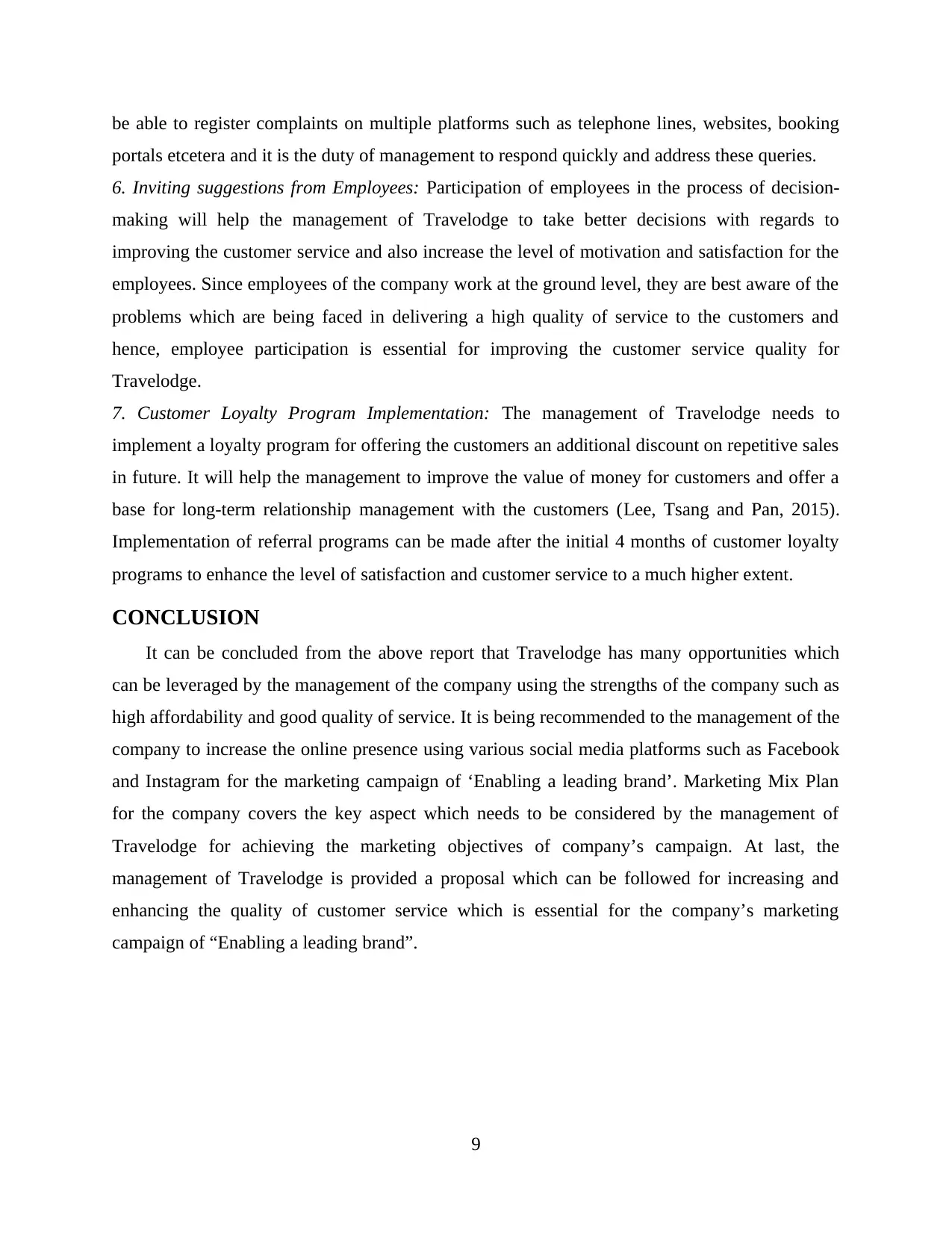
be able to register complaints on multiple platforms such as telephone lines, websites, booking
portals etcetera and it is the duty of management to respond quickly and address these queries.
6. Inviting suggestions from Employees: Participation of employees in the process of decision-
making will help the management of Travelodge to take better decisions with regards to
improving the customer service and also increase the level of motivation and satisfaction for the
employees. Since employees of the company work at the ground level, they are best aware of the
problems which are being faced in delivering a high quality of service to the customers and
hence, employee participation is essential for improving the customer service quality for
Travelodge.
7. Customer Loyalty Program Implementation: The management of Travelodge needs to
implement a loyalty program for offering the customers an additional discount on repetitive sales
in future. It will help the management to improve the value of money for customers and offer a
base for long-term relationship management with the customers (Lee, Tsang and Pan, 2015).
Implementation of referral programs can be made after the initial 4 months of customer loyalty
programs to enhance the level of satisfaction and customer service to a much higher extent.
CONCLUSION
It can be concluded from the above report that Travelodge has many opportunities which
can be leveraged by the management of the company using the strengths of the company such as
high affordability and good quality of service. It is being recommended to the management of the
company to increase the online presence using various social media platforms such as Facebook
and Instagram for the marketing campaign of ‘Enabling a leading brand’. Marketing Mix Plan
for the company covers the key aspect which needs to be considered by the management of
Travelodge for achieving the marketing objectives of company’s campaign. At last, the
management of Travelodge is provided a proposal which can be followed for increasing and
enhancing the quality of customer service which is essential for the company’s marketing
campaign of “Enabling a leading brand”.
9
portals etcetera and it is the duty of management to respond quickly and address these queries.
6. Inviting suggestions from Employees: Participation of employees in the process of decision-
making will help the management of Travelodge to take better decisions with regards to
improving the customer service and also increase the level of motivation and satisfaction for the
employees. Since employees of the company work at the ground level, they are best aware of the
problems which are being faced in delivering a high quality of service to the customers and
hence, employee participation is essential for improving the customer service quality for
Travelodge.
7. Customer Loyalty Program Implementation: The management of Travelodge needs to
implement a loyalty program for offering the customers an additional discount on repetitive sales
in future. It will help the management to improve the value of money for customers and offer a
base for long-term relationship management with the customers (Lee, Tsang and Pan, 2015).
Implementation of referral programs can be made after the initial 4 months of customer loyalty
programs to enhance the level of satisfaction and customer service to a much higher extent.
CONCLUSION
It can be concluded from the above report that Travelodge has many opportunities which
can be leveraged by the management of the company using the strengths of the company such as
high affordability and good quality of service. It is being recommended to the management of the
company to increase the online presence using various social media platforms such as Facebook
and Instagram for the marketing campaign of ‘Enabling a leading brand’. Marketing Mix Plan
for the company covers the key aspect which needs to be considered by the management of
Travelodge for achieving the marketing objectives of company’s campaign. At last, the
management of Travelodge is provided a proposal which can be followed for increasing and
enhancing the quality of customer service which is essential for the company’s marketing
campaign of “Enabling a leading brand”.
9
⊘ This is a preview!⊘
Do you want full access?
Subscribe today to unlock all pages.

Trusted by 1+ million students worldwide
1 out of 13
Related Documents
Your All-in-One AI-Powered Toolkit for Academic Success.
+13062052269
info@desklib.com
Available 24*7 on WhatsApp / Email
![[object Object]](/_next/static/media/star-bottom.7253800d.svg)
Unlock your academic potential
Copyright © 2020–2026 A2Z Services. All Rights Reserved. Developed and managed by ZUCOL.





